 | 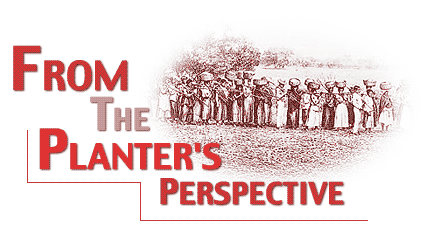
 |
In my analysis of two dissimilar accounts of slave resistance in Jamaica during the early 19th century, I hope to construct a broad picture of the types of punishments that plantation owners and their employees used against slaves who chose to resist oppression. The two authors that I discuss describe the relationships between the enslaved Africans and their masters. These accounts show that planters and enslaved blacks each attempted to manipulate their mutual relationship, affecting the magnitude of slave opposition and the repercussions of resistance.
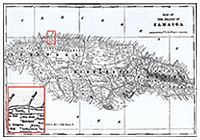 Mathew Gregory Lewis’ account of his initial residence in Jamaica, from 1815-1816, depicts his distinct perspective on slaves and his interactions with them. Immediately upon his arrival, Lewis claimed a paternal role in relation to his slaves, which he, like all white men, saw as inferior beings, incapable of self-sufficiency. This belief became apparent when Lewis wrote about the law of provisions, which permitted the slaves a day to tend their plots of land. This happened regularly every week, supposedly so that they would not gather too much at once and end up trading it for alcohol which, in turn, would send them begging after a short period of time, "for they are so thoughtless and improvident." Lewis’ rationale in this case shows how he belittled the slaves, validating (for himself) his authority over them and justifying their enslavement. Mathew Gregory Lewis’ account of his initial residence in Jamaica, from 1815-1816, depicts his distinct perspective on slaves and his interactions with them. Immediately upon his arrival, Lewis claimed a paternal role in relation to his slaves, which he, like all white men, saw as inferior beings, incapable of self-sufficiency. This belief became apparent when Lewis wrote about the law of provisions, which permitted the slaves a day to tend their plots of land. This happened regularly every week, supposedly so that they would not gather too much at once and end up trading it for alcohol which, in turn, would send them begging after a short period of time, "for they are so thoughtless and improvident." Lewis’ rationale in this case shows how he belittled the slaves, validating (for himself) his authority over them and justifying their enslavement.
While sharing the paternalism of other planters, Lewis expressed it differently. Throughout his
journal, he described the atypical types of punishments he imposed on the slaves for their insubordinate behaviors. Forbidding the use of the cart-whip on Cornwall estate because he saw it as a deplorable tool of tyranny, he chose to treat the slaves relatively kindly so that he could threaten them with their departure or refuse them privileges when they got out of line. Sometimes, he even rewarded their resistance in order to regain control of the situation. When thirty slaves feigned sicknesses on one day "in order to sit idle, and chat away the time with their friends." Lewis responded to this by distributing gifts to them from England. He then let the slaves take possession of his own dwelling so that they could "amuse themselves." Soon the slaves began to comply once more with their "massa," feeding his already bulging ego.
Conversely, the slaves also used this uncommon relationship to manipulate Lewis. Knowing that he believed himself to be morally righteous, the slaves knew he would not knowingly allow the brutal tortures and punishments so common on Jamaican plantations. As a result, they did not hesitate to resist in any way they could. One of the white agents working on Cornwall w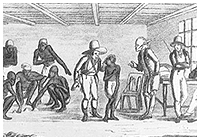 as attacked when the slaves seized the mill. Miss Whaunica, one of the revolting slave women "flew at his [the agents] throat, and endeavored to strangle him," for attempting to suppress the rebellion. Lewis’ responded to this riotous episode not by physical violence, but by threatening to sell the most adamant mutineers and sailing back to England, never returning to Jamaica. This again restored civility for a brief interlude and allowed Lewis to maintain his illusions of moral grandeur. as attacked when the slaves seized the mill. Miss Whaunica, one of the revolting slave women "flew at his [the agents] throat, and endeavored to strangle him," for attempting to suppress the rebellion. Lewis’ responded to this riotous episode not by physical violence, but by threatening to sell the most adamant mutineers and sailing back to England, never returning to Jamaica. This again restored civility for a brief interlude and allowed Lewis to maintain his illusions of moral grandeur.
Not only did Lewis’ own slaves take advantage of his lax treatment, but the slaves from neighboring plantations would find ways to benefit from his charitable disposition. Peppered throughout his account are many instances of complaints brought to Lewis by slaves from various other estates. He would always listen to them, sometimes spending many days "for above an hour and a half." In several cases he wrote letters to the governor stating these charges of callous treatment. He would even give such slaves food and other items. He gave a blanket to one woman who complained of being to cold because her owner would not provide adequate "bedclothes." Lewis’ self-righteousness resulted in a distinctly abnormal relationship between him and the slaves of Jamaica.
The mutually manipulative connection between Lewis and his slaves does not seem to have been typical for Jamaica during this time. An alternative source is the memoir of Benjamin M’Mahon, a bookkeeper employed on twenty-four different plantations during his eighteen-year residence from 1819-1837. In contrast to the travel account of Mathew Gregory Lewis, M’Mahon also reported on the general practices of the slave drivers, and the other employees of the plantation. Overall he witnessed relationships quite different from the paternalistic games recorded by Lewis.
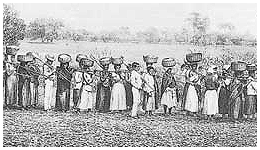 The first thing that is important to note is that even though M’Mahon stated, "I abhor slavery in my very soul," and was "anxious to expose the treachery, the torture, and the tyranny, practiced by the overseers and attorneys of Jamaica," he still viewed the enslaved African as an inferior being. He described the overall relationship between the master and slave as a trainer trying to break a wild animal. "The tiger from the jungle may be tamed…it is far more probable, that he will retain his native ferociousness, though confined to his cage…but what cage is sufficiently strong enough to restrain these human tigers…" These written statements contain the all too common stereotype of the African man being a wild and ferocious, jungle dwelling, uncivilized beast who was in desperate need of guidance. Even though their accounts are otherwise quite different, M’Mahon, like Lewis, in his own way embraced plantation Jamaica’s ubiquitous racism. The first thing that is important to note is that even though M’Mahon stated, "I abhor slavery in my very soul," and was "anxious to expose the treachery, the torture, and the tyranny, practiced by the overseers and attorneys of Jamaica," he still viewed the enslaved African as an inferior being. He described the overall relationship between the master and slave as a trainer trying to break a wild animal. "The tiger from the jungle may be tamed…it is far more probable, that he will retain his native ferociousness, though confined to his cage…but what cage is sufficiently strong enough to restrain these human tigers…" These written statements contain the all too common stereotype of the African man being a wild and ferocious, jungle dwelling, uncivilized beast who was in desperate need of guidance. Even though their accounts are otherwise quite different, M’Mahon, like Lewis, in his own way embraced plantation Jamaica’s ubiquitous racism.
Aside from this solitary parallel viewpoint shared by the two writers, (as well as most other Europeans at this time), M’Mahon’s perceptions of the planter-slave association were different to those of Lewis. At the age of seventeen, M’Mahon had begun working as a bookeeper on Bloxburgh Estate, which at the time was a coffee plantation in the Port Royal Mountains. His reports of his residence at Bloxburgh provided sufficient details to establish a general overview of the master-slave relationship as was seen through his eyes. Beginning at 4 AM, M’Mahon presented himself at a designated site near the field and called attendance. Any slave absent would be thrown to the ground and flogged by the driver in a way that would humiliate the victim in front of the other slaves. This, M’Mahon stated, "was the general practice through Jamaica." Although the proprietor, T.P. Kellerman, was described by the author as a "good natured man," and the overseer, Henry P. Roberts, was said to have "detested brutal practices," flogging was still an everyday occurrence on the plantation. Here, he portrayed the relationship between the slave and the slave driver like that of a horse trainer breaking a wild stallion.
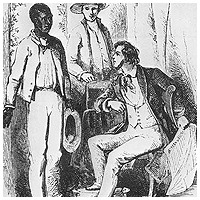 M’Mahon’s experiences at Bloxburgh Estate also enabled him to describe the ways in which the interactions between various plantation managers influenced the treatment of the resisting slaves. When the proprietor, T.P. Kellerman, formed a relationship with Charles Austin, a neighboring plantation overseer described as "a monster in human shape," Kellerman rapidly became just as merciless. As for the "good natured" overseer, Henry P. Roberts, he was dismissed and replaced by Daniel Wait, described as "crafty and cruel." M’Mahon pointed at the following as the reason for this rapid change in administration: "No man could succeed in the planting line, but one whose heart was hard and adamant; he must have no pity for the Negro…." The problems Lewis encountered due to his desire to cast himself as the star of this moral pageantry supports M’Mahon’s claim that vicious cruelty was an absolute necessity for successful maintenance of planter authority against black resistance. M’Mahon’s experiences at Bloxburgh Estate also enabled him to describe the ways in which the interactions between various plantation managers influenced the treatment of the resisting slaves. When the proprietor, T.P. Kellerman, formed a relationship with Charles Austin, a neighboring plantation overseer described as "a monster in human shape," Kellerman rapidly became just as merciless. As for the "good natured" overseer, Henry P. Roberts, he was dismissed and replaced by Daniel Wait, described as "crafty and cruel." M’Mahon pointed at the following as the reason for this rapid change in administration: "No man could succeed in the planting line, but one whose heart was hard and adamant; he must have no pity for the Negro…." The problems Lewis encountered due to his desire to cast himself as the star of this moral pageantry supports M’Mahon’s claim that vicious cruelty was an absolute necessity for successful maintenance of planter authority against black resistance.
Matthew Gregory Lewis and Benjamin M’Mahon offer two opposing accounts of the dealings between Jamaican slaves and their owners and overseers during the early 19th century. By interpreting the relationships between these two sets of people, the types of perceptions the planters had towards resistance, punishment, and plantation management become apparent. Both M’Mahon and Lewis despised ruthless punishments against the enslaved Africans. Nevertheless, each continued to support the institution of slavery, helping to enable its unwavering brutality.
|
Mathew Gregory Lewis ESQ. M.P. Journal of a West India Proprietor Kept During a Residence in the Island of Jamaica (New Street Square, London: A. Spotswood Printer. 1834). 83.
Benjamin M’Mahon. Jamaica Plantership: Eighteen Years Employed in the Planting Line in that Island. (London, Effingham Wilson: J. Matthew Printer. 1839). ii. |

 |





